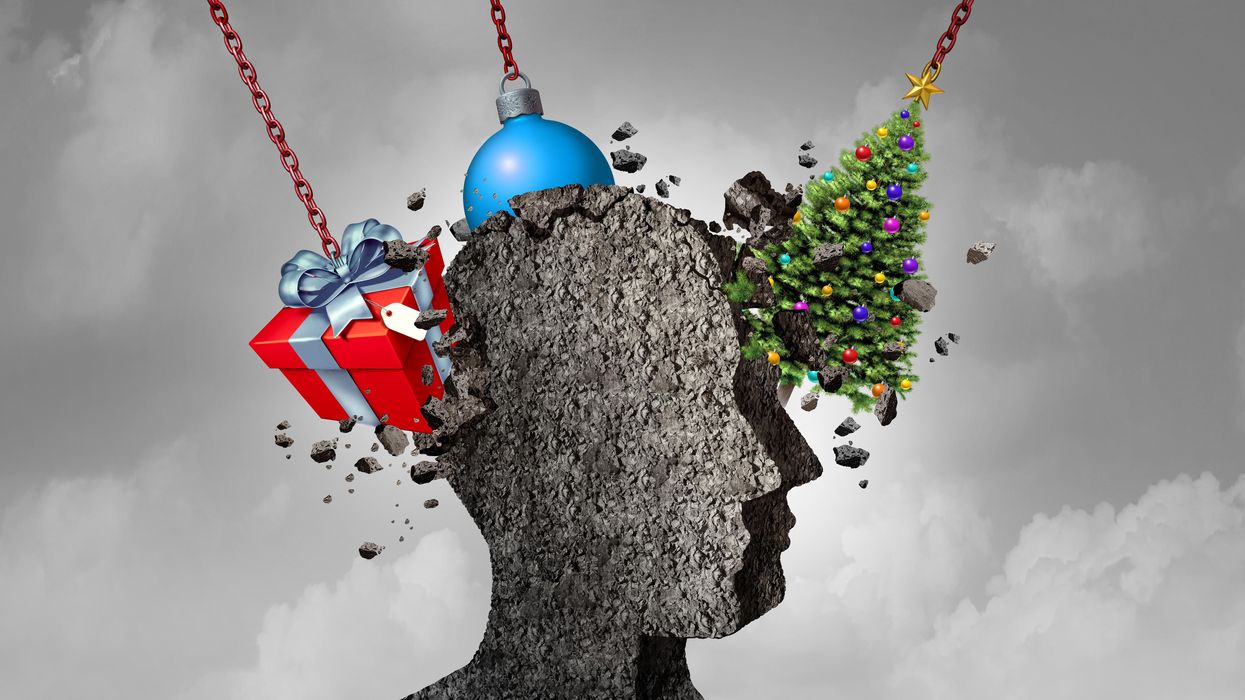Podcast: The Inner Lives of Human Breasts
Lina Zeldovich has written about science, medicine and technology for Popular Science, Smithsonian, National Geographic, Scientific American, Reader’s Digest, the New York Times and other major national and international publications. A Columbia J-School alumna, she has won several awards for her stories, including the ASJA Crisis Coverage Award for Covid reporting, and has been a contributing editor at Nautilus Magazine. In 2021, Zeldovich released her first book, The Other Dark Matter, published by the University of Chicago Press, about the science and business of turning waste into wealth and health. You can find her on http://linazeldovich.com/ and @linazeldovich.

In today's episode, Leaps.org interviews Camila dos Santos, a molecular biologist at Cold Spring Harbor Lab, about her research on breasts and what makes them unique compared to any other part of the body.
My guest today for the Making Sense of Science podcast is Camila dos Santos, associate professor at Cold Spring Harbor Lab, who is a leading researcher of the inner lives of human mammary glands, more commonly known as breasts. These organs are unlike any other because throughout life they undergo numerous changes, first in puberty, then during pregnancies and lactation periods, and finally at the end of the cycle, when babies are weaned. A complex interplay of hormones governs these processes, in some cases increasing the risk of breast cancer and sometimes lowering it. Witnessing the molecular mechanics behind these processes in humans is not possible, so instead Dos Santos studies organoids—the clumps of breast cells donated by patients who undergo breast reduction surgeries or biopsies.
Show notes:
2:52 In response to hormones that arise during puberty, the breast cells grow and become more specialized, preparing the tissue for making milk.
7:53 How do breast cells know when to produce milk? It’s all governed by chemical messaging in the body. When the baby is born, the brain will release the hormone called oxytocin, which will make the breast cells contract and release the milk.
12:40 Breast resident immune cells are including T-cells and B-cells, but because they live inside the breast tissue their functions differ from the immune cells in other parts of the body,
17:00 With organoids—dimensional clumps of cells that are cultured in a dish—it is possible to visualize and study how these cells produce milk.
21:50 Women who are pregnant later in life are more likely to require medical intervention to breastfeed. Scientists are trying to understand the fundamental reasons why it happens.
26:10 Breast cancer has many risks factors. Generic mutations play a big role. All of us have the BRCA genes, but it is the alternation in the DNA sequence of the BRCA gene that can increase the predisposition to breast cancer. Aging and menopause are the risk factors for breast cancer, and so are pregnancies.
29:22 Women that are pregnant before the age of 20 to 25, have a decreased risk of breast cancer. And the hypothesis here is that during pregnancy breast cells more specialized, as specialized cells, they have a limited lifespan. It's more likely that they die before they turn into cancer.
33:08 Organoids are giving scientists an opportunity to practice personalized medicine. Scientists can test drugs on organoids taken from a patient to identify the most efficient treatment protocol.
Links:
Camila dos Santos’s Lab Page.
Editor's note: In addition to being a regular writer for Leaps.org, Lina Zeldovich is the guest host for today's episode of the Making Sense of Science podcast.
Lina Zeldovich has written about science, medicine and technology for Popular Science, Smithsonian, National Geographic, Scientific American, Reader’s Digest, the New York Times and other major national and international publications. A Columbia J-School alumna, she has won several awards for her stories, including the ASJA Crisis Coverage Award for Covid reporting, and has been a contributing editor at Nautilus Magazine. In 2021, Zeldovich released her first book, The Other Dark Matter, published by the University of Chicago Press, about the science and business of turning waste into wealth and health. You can find her on http://linazeldovich.com/ and @linazeldovich.
Sexually Transmitted Infections are on the rise. This drug could stop them.
Cases of gonorrhea, chlamydia and syphilis soared last year, but researchers are finding that a drug known as doxy seems to reduce the number of infections.
Sexually transmitted infections (STIs) are surging across the U.S. to 2.5 million cases in 2021 according to preliminary data from the CDC. A new prevention and treatment strategy now in clinical trials may provide a way to get a handle on them.
It's easy to overlook the soaring rates of gonorrhea, chlamydia, and syphilis because most of those infections have few or no symptoms and can be identified only through testing. But left untreated, they can lead to serious damage to nerves and tissue, resulting in infertility, blindness, and dementia. Infants developing in utero are particularly vulnerable.
Covid-19 played havoc with regular medical treatment and preventive care for many health problems, including STIs. After formal lockdowns ended, many people gradually became more socially engaged, with increases in sexual activity, and may have prioritized these activities over getting back in touch with their doctors.
A second blow to controlling STIs is that family planning clinics are closing left and right because of the Dobbs decision and legislation in many states that curtailed access to an abortion. Discussion has focused on abortion, but those same clinics also play a vital role in the diagnosis and treatment of STIs.
Routine public health is the neglected stepchild of medicine. It is called upon in times of crisis but as that crisis resolves, funding dries up. Labs have atrophied and personnel have been redirected to Covid, “so access to routine screening for STIs has been decimated,” says Jennifer Mahn, director of sexual and clinical health with the National Coalition of STD Directors.
A preview of what we likely are facing comes from Iowa. In 2017, the state legislature restricted funding to family health clinics in four counties, which closed their doors. A year later the statewide rate of gonorrhea skyrocketed from 83 to 153.7 cases per 100,000 people. “Iowa counties with clinic closures had a significantly larger increase,” according to a study published in JAMA. That scenario likely is playing out in countless other regions where access to sexual health care is shrinking; it will be many months before we have the data to know for sure.
A decades-old antibiotic finds a new purpose
Using drugs to protect against HIV, either as post exposure prophylaxis (PEP) or pre-exposure prophylaxis (PrEP), has proven to be quite successful. Researchers wondered if the same approach might be applied to other STIs. They focused on doxycycline, or doxy for short. One of the most commonly prescribed antibiotics in the U.S., it’s a member of the tetracycline family that has been on the market since 1967. It is so safe that it’s used to treat acne.
Two small studies using doxy suggested that it could work to prevent STIs. A handful of clinical trials by different researchers and funding sources set out to generate the additional evidence needed to prove their hypothesis and change the standard of care.
Senior researcher Victor Omollo, with the Kenya Medical Research Institute, noted, “These are prevention interventions that women can control on their own without having to seek or get consent from another person,” as is the case with condom use.
The first with results is the DoxyPEP study, conducted at two sexual health clinics in San Francisco and Seattle. It drew from a mix of transgender women and men who have sex with men, who had at least one diagnosed STI over the last year. The researchers divided the participants into two groups: one with people who were already HIV-positive and engaged in care, while the other group consisted of people who were on PrEP to prevent infection with HIV. For the active part of the study, a subset of the participants received doxy, and the rest of the participants did not.
The researchers intentionally chose to do the study in a population at the highest risk of having STIs, who were very health oriented, and “who were getting screened every three months or so as part of their PrEP program or their HIV care program,” says Connie Celum, a senior researcher at the University of Washington on the study.
Each member of the active group was given a supply of doxy and asked to take two pills within 72 hours of having sex where a condom was not used. The study was supposed to run for two years but, in May, it stopped halfway through, when a safety monitoring board looked at the data and recommended that it would be unethical to continue depriving the control group of the drug’s benefits.
Celum presented these preliminary results from the DoxyPEP study in July at the International AIDS Conference in Montreal. “We saw about a 56 percent reduction in gonorrhea, about 80 percent reduction in chlamydia and syphilis, so very significant reductions, and this is on a per quarter basis,” she told a later webinar.
In Kenya, another study is following a group of cisgender women who are taking the same two-pill regimen to prevent HIV, and the data from this research should become available in 2023. Senior researcher Victor Omollo, with the Kenya Medical Research Institute, noted that “these are prevention interventions that women can control on their own without having to seek or get consent from another person,” as is the case with condom use, another effective prevention tool.
Antibiotic resistance
Antibiotic resistance is a potentially big concern. About 25 percent of gonorrhea strains circulating in the U.S. are resistant to the tetracycline class of drugs, including doxy; rates are higher elsewhere. But resistance often is a matter of degree and can be overcome with a larger or longer dose of the drug, or perhaps with a switch to another drug or a two-drug combination.
Research has shown that an established bacterial infection is more difficult to treat because it is part of a biofilm, which can leave only a small portion or perhaps none of the cell surface exposed to a drug. But a new infection, even one where the bacteria is resistant to a drug, might still be vulnerable to that drug if it's used before the bacterial biofilm can be established. Preliminary data suggests that may be the case with doxyPEP and drug resistant gonorrhea; some but not all new drug resistant infections might be thwarted if they’re treated early enough.
“There are some tradeoffs” to these interventions, Celum says, and people may disagree on the cost of increased resistance balanced against the benefits of treating the STIs and reducing their spread within the community.
Resistance does not seem to be an issue yet for chlamydia and syphilis even though doxy has been a recommended treatment for decades, but a remaining question is whether broader use of doxy will directly worsen antibiotic resistance in gonorrhea, or promote it in other STIs. And how will it affect the gut microbiome?
In addition, Celum notes that we need to understand whether doxy will generate mutations in other bacteria that might contribute to drug resistance for gonorrhea, chlamydia or syphilis. The studies underway aim to provide data to answer these questions.
“There are some tradeoffs” to these interventions, Celum says, and people may disagree on the cost of increased resistance balanced against the benefits of treating the STIs and reducing their spread within the community. That might affect doctors' willingness to prescribe the drug.
Turning research into action
The CDC makes policy recommendations for prevention services such as taking doxy, requiring some and leaving others optional. Celum says the CDC will be reviewing information from her trial at a meeting in December, but probably will wait until that study is published before making recommendations, likely in 2023. The San Francisco Department of Public Health issued its own guidance on October 20th and anecdotally, some doctors around the country are beginning to issue prescriptions for doxy to select patients.
About half of new STIs occur in young people ages 15 to 24, a group that is least likely to regularly see a doctor. And sexual health remains a great taboo for many people who don't want such information on their health record for prying parents, employers or neighbors to find out.
“People will go out of their way and travel extensive distances just to avoid that,” says Mahn, the National Coalition director. “People identify locations where they feel safe, where they feel welcome, where they don't feel judged,” Mahn explains, such as community and family planning clinics. They understand those issues and have fees that vary depending on a person’s ability to pay.
Given that these clinics already are understaffed and underfunded, they will be hard pressed to expand services covering the labor intensive testing and monitoring of a doxyPEP regimen. Sexual health clinics don't even have a separate line item in the federal budget for health. That is something the National Association of STI Directors is pushing for in D.C.
DoxyPEP isn't a panacea, and it isn't for everyone. “We really want to try to reach that population who is most likely going to have an STI in the next year,” says Celum, “Because that's where you are going to have the biggest impact.”
The Friday Five: The plain solution to holiday stress?
In this week's Friday Five, research on how to improve your working memory, the plain old solution to stress, rise of the robot surgeon, tomato brain power, the gut connection to health after strokes - and more.
The Friday Five covers five stories in research that you may have missed this week. There are plenty of controversies and troubling ethical issues in science – and we get into many of them in our online magazine – but this news roundup focuses on scientific creativity and progress to give you a therapeutic dose of inspiration headed into the weekend.
Listen on Apple | Listen on Spotify | Listen on Stitcher | Listen on Amazon | Listen on Google
Here are the promising studies covered in this week's Friday Five:
- How to improve your working memory
- A plain old solution to stress
- Progress on a deadly cancer for first time since 1995*
- Rise of the robot surgeon
- Tomato brain power
And in an honorable mention this week, new research on the gut connection to better brain health after strokes.
* The methodology for this study has come under scrutiny here.

